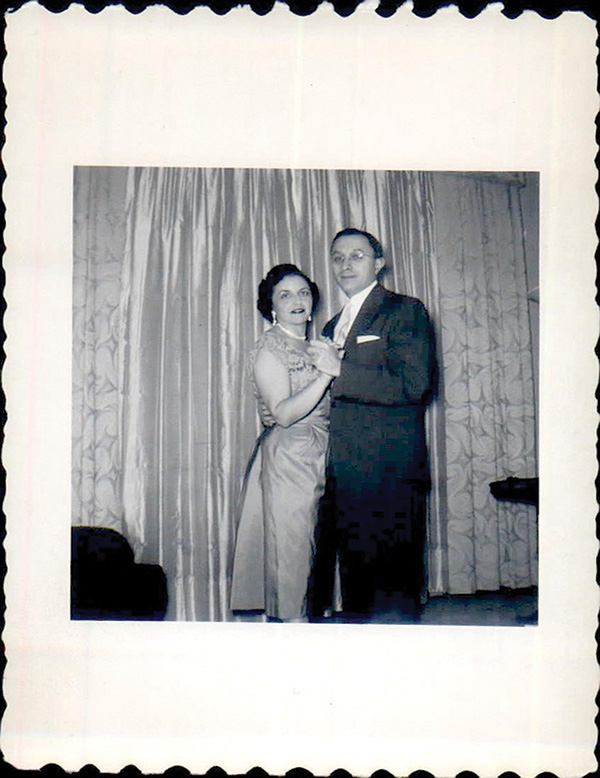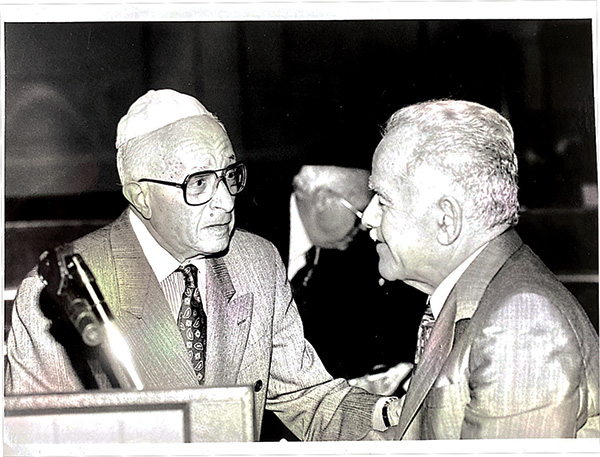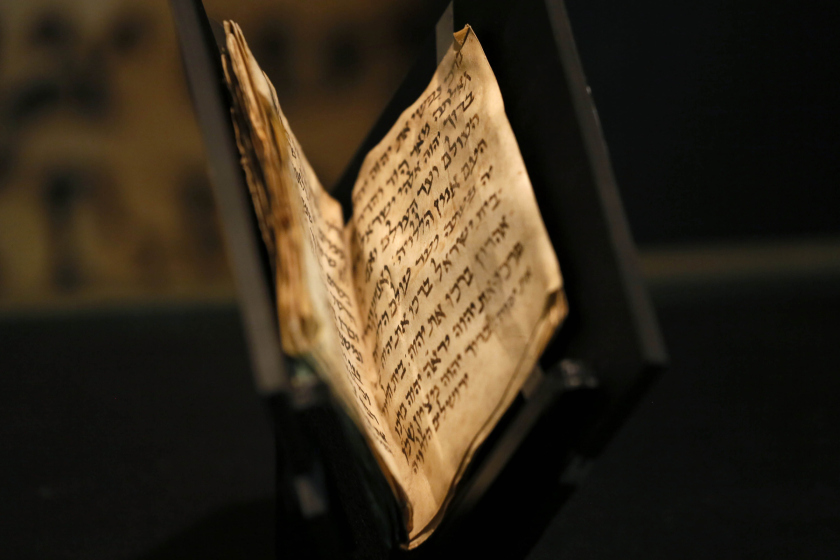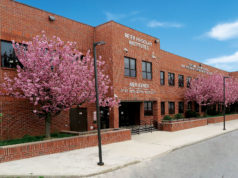
IN MORE THAN 20 SYNAGOGUES IN BROOKLYN’S SYRIAN JEWISH COMMUNITY, AS WELL AS HUNDREDS OF SEPHARDIC COMMUNITIES AROUND THE WORLD, CONGREGANTS PRAY ACCORDING TO THE TRADITIONS OF ARAM SOBA WITH BOOKS PRINTED BY THE SEPHARDIC HERITAGE FOUNDATION, FOUNDED BY SAM CATTON IN 1970.
Millions of pizmonim, prayer, holiday and kiddush books are in every home, every synagogue and every Sephardic community. Based on the impact that Sam had on Sephardic Jewry worldwide with his publications, Chief Rabbi Mordechai Eliyahu called him Ba’al Hasefarimor (Master of the Books), a title that he cherished and stuck with him since.
This is considered the most lasting and significant contribution of Sam Catton, an early community leader and visionary, who always did everything he could to promote the traditions of Sephardim. Although the community had been founded decades earlier, when he went to synagogue, Sam saw that people prayed with different books. In people’s homes, old pizmonim books were frayed and tattered. There were many different versions.
In the days before the Internet, when communication was with letters, Sam began collecting the pizmonin of the community. He consulted with rabbis and hazzanim from communities all over the world to produce the first pizmonim books, now the cornerstone of our community. From there, the High Holiday books were developed. And then each holiday, the Kiddush book and so on. All of the books were published by the Sephardic Heritage Foundation.
“These books are the mainstay of our community and they framed community traditions,” said his grandson David Catton, who has continued his legacy as the current President of Sephardic Heritage Foundation. “When there was a need for Mahazorim and Siddurim, Sam Catton developed high quality and universally accepted books, which reinvigorated the prayers and kavanot (feelings) of the community.”

One of five children, Sam was born in 1910 and raised in Atlantic City, NJ, where there was an offshoot Syrian community. He came from humble beginnings and knew early the value of money and hard work. As a child peddler, his father gave him a bag of items to sell each day. He once knocked on the door of an aristocratic woman. “Why aren’t you on the beach playing?” she said.
“I have to sell these to bring money home to my family,” Sam answered. The woman bought all his goods for $25 on the condition that he go to the beach and play. Sam went home and his father gave him another bag of items to peddle, telling him to go to a different neighborhood so the woman wouldn’t see him.
Sam’s Jewish education was from the small Talmud Torah in Atlantic City. In the 1920s Rabbi Aboud Kilsi A”H arrived from Turkey and had a very profound effect on Sam’s Jewish learning. Sam went from almost no knowledge at all, to learning Gemara, Torah and Mishnah. Rabbi Kilsi’s influence would follow Sam for his whole life.
It was about 1925, when the family moved to Brooklyn. A natural leader, Sam became president of the youth program at Congregation Magen David and was a strong disciple of Rabbi Matloub Abadi. This began a student-teacher relationship that lasted for the next 40 years. Rabbi Abadi instilled a love for Torah that lit an eternal flame within Sam.
Sam met and married Rae Safdeye in 1937. In the late 1930s, before World War II, Sam was working in the children’s clothing business in the Philippines. In 1939, his son Harry was born. Due to slow communication, it took three months for Sam to find out about the birth of his firstborn son.

While in the Philippines, Sam became close with a number of people, including (my father-in-law) Simon D. Roffé, who was in the Philippines working at Equitable Infants Wear with his brother-in-law, Ralph Tawil.
“Both worked in children’s wear,” said Harry Catton. “When World War II was beginning, the Japanese starting to boast about taking over.” Sam and others heeded the warning and left Manila, but Simon was a French citizen and thought he was safe. Simon ended up spending 39 months in the Los Banos POW camp, losing everything during the war.
Years later, Simon returned to New York, married and had children of his own. Sam had several businesses in the interim, eventually opening Catton Brothers, also a children’s clothing importer. He hired his lifelong friend Simon as the Catton Brothers warehouse manager.
“Simon watched our money like it was his. He tried to save money for us to keep expenses down and was very forward thinking. When computers came out, he learned to work them, he spent time on computers. Everyone marveled that in his 1970s, he worked on a computer,” said Harry.
The friendships Sam had, went to the values of family, hard-work, and loyalty that he learned as a child. “My parents (Rae and Sam Catton) sacrificed for us (Harry and Eddie A”H). We received a yeshivah education at Yeshiva of Flatbush (YOF), which was a financial hardship for them. They wanted us to have a good Jewish education,” said Harry, the first Syrian child to attend YOF.
“My parents were in their 40s before they owned a car. All four of us lived in a one-bedroom apartment across from Seth Low Park. Their pleasures took a back seat. They took care of us to make us grow up in the mold they wanted, to follow our traditions.”
As a community leader, Sam had many other accomplishments of note. A strong supporter of Israel, during the War of Independence in 1948, he raised funds to buy arms for Israel. The guns and ammunition were taken in unmarked trucks to piers in crates marked farm equipment and sent by boat. He was the first to head the Sephardic Division of UJA. On a trip to Israel, he met and encouraged Hakham Ovadia Yosef to begin the Shas Party to represent Sephardic Jews.

When Sam Catton was concerned that the next generation had forgotten their roots, he wrote the trilogy, Men of Faith and Vision, documenting the community and its origins. He was involved in many community organizations and was a founder of Magen David Yeshivah and Congregation B’nei Yitzhak (with the Gindi family).
“Family always came first. He believed in uniting people, because it gives us strength to be united,” said Diane Catton.
“We must focus on the things that unite us, and not the things that divide us.” a quote by Sam Catton.



